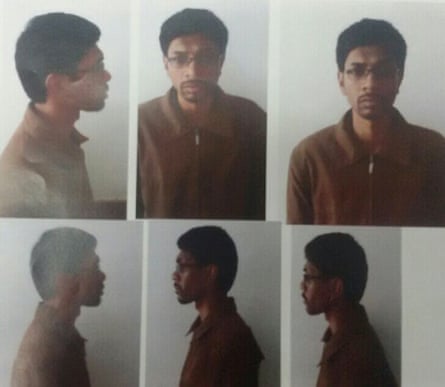The first photographs have emerged of Australian senior Isis member, Neil Prakash, following his capture and imprisonment in Turkey.
The photographs obtained by the Guardian show the accused terrorist with a face that has thinned noticeably since he appeared more than six months ago in publicity material as one of the extremist group’s chief recruiters.
Prakash, whom the Australian government believed had been killed in an airstrike in Iraq’s second city, Mosul, in May, was arrested by Turkish border guards on 24 October, in the southern village of Inali, the Guardian has confirmed.
At first, Australia’s most wanted man claimed to be a Cambodian national named Piseth Doung. However, Turkish officials said they recognised Prakash’s Australian accent and formally charged him with terrorism the following day.
Since then, he has been held in a prison in southern Turkey, where officials from both the Turkish and Australian governments have interviewed him.
Prakash featured prominently in propaganda videos exhorting Australians to join Isis – an ultra hardline group that proscribes as apostates anyone who does not share its hardline read of Islamic tenets.
He was believed to have been killed during a US-led attack on central Mosul. At the time, Iraqi officials said Prakash had been in one of the city’s banks, which Isis had commandeered and was using to sort cash to be distributed around its so called Caliphate.
Prakash was one of three senior Australian members of the group who was thought to have been killed, alongside Mohammed Elomar and Khaled Sharrouf. Australian security officials believe dozens of Australians have been killed fighting in Iraq and Syria.

After carving a swath of influence in both countries, Isis is now on the back foot militarily with a sustained US-led campaign of airstrikes and gains by forces on the ground shrinking the so called caliphate by more than 60% in the past year.
The loss of territory has seen the group’s command and control slowly disintegrate and led its leaders to focus more on controlling populations than geography.
The switch in tactics has seen Isis send senior figures to Europe and beyond where they have been tasked with staging spectacular attacks like those seen in Paris and Brussels, as well as lone-wolf strikes like the truck rampage in Nice.
Prakash’s reported demise in May was at the time heralded by the Australian government as a major victory against Isis. Australia’s attorney general, George Brandis, said: “His death disrupts and degrades Isil’s ability to recruit vulnerable people in our community to conduct terrorist acts.”
Prakash has been actively involved in attempts to compel Australians to fight overseas and encouraging individuals to carry out attacks on Australian soil. He entered Syria in 2013 and has featured prominently in propaganda material disseminated by Isis.
The child of Cambodian and Fijian migrants, Prakash is originally from Melbourne. He converted to Islam in 2012, and attended the al-Furqan Islamic centre. The centre came to public attention more recently after two 18-year-olds linked to the centre were charged with terrorism offences in 2015. It was subsequently closed.
The Australian federal police issued a first instance arrest warrant for Prakash in August 2015.
The warrant is still current, and Australia’s justice minister, Michael Keenan, has announced that Australia has lodged a formal extradition request with Turkey.
But it remains unclear how Turkish authorities will respond to the request. Prakash could also be charged with offences in Turkey, and local authorities may still seek to prosecute him there.
Some defence experts have warned against extraditing Prakash, in part because it could lead to him becoming a “totem” for local extremists in Australia.
